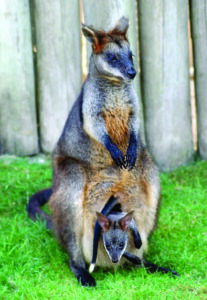By Dr. Beth Leermakers
This Mother’s Day we celebrate moms everywhere, including animal mothers. Let’s look at the incredible ways some animal mothers go above and beyond to care for their young. From vampire bats sharing blood meals even when sick and swamp wallabies who are pregnant all the time, to the dolphin and lion mothers who adopted babies from another species, these animal moms are true marvels.
Like human mothers, some animal moms go to extraordinary lengths to care for their offspring.
No sick days for vampire bat moms. Vampire bats, often maligned as blood sucking enemies, are intelligent, social and giving creatures. Vampire bat moms regurgitate their blood meals to feed their young — even when they feel ill.
Researchers at Ohio State University observed the frequency of food sharing and grooming behaviors among vampire bats after some were injected with a substance that activated their immune system and made them feel sick for several hours (but didn’t infect them with an actual illness). Bats that felt sick had fewer social interactions (likely due to feeling lethargic), but vampire bat moms continued grooming their offspring, even when they felt unwell. The mothers also continued sharing food with their young.

Photo courtesy of Cougar Mountain Zoo
Swamp wallabies: permanently pregnant. After they reach sexual maturity, female swamp wallabies are pregnant all the time; they don’t take a break between pregnancies. According to research about the reproductive habits of marsupials, female swamp wallabies are the only mammal that is permanently pregnant throughout its life. The females come into heat, mate, and form a new embryo one to two days before the end of their current pregnancy.
How can swamp wallabies get pregnant again while they’re already pregnant?
Female swamp wallabies have two separate uteri. The new embryo formed at the end of the first pregnancy develops in the second, ‘unused’ uterus. Then, once the newborn from the first pregnancy begins to suck milk, the new embryo enters a long period of developmental arrest, lasting up to 11 months or more. When the young in the pouch starts to nurse less often, the dormant embryo starts growing again, and the cycle repeats itself.
Wallaby moms support young at three different stages of development: an embryo in the uterus, a young joey nursing in the pouch, and an older, semi-dependent joey that has left the pouch but is still nursing.
Mammals very rarely care for young of another species. Adoption and nursing require too much maternal investment of time, energy and milk/food to devote to raising offspring that are not genetically related.
In fact, there have only been a few scientifically documented cases of interspecies adoption among wild mammals. In 2006, a primatologist discovered a group of capuchin monkeys raising a baby marmoset as one of their own.
Marine mammals. A female bottlenose dolphin spent more than three years caring for a young melon-headed whale — even though she already had her own biological baby. That is unusual because dolphin mothers typically only care for one calf at a time. The dolphin mother adopted the baby whale when he was one and a half months old and cared for him until he was presumably weaned in 2018. According to the study, the young guy competed with his dolphin “sister” for his mom’s attention, regularly pushing the slightly older dolphin out of her place under mom’s abdomen. While the female bottlenose dolphin socialized with her peers, the whale rarely left his mother’s side. He did, however, adopt bottlenose behaviors such as jumping, surfing and socializing with other young males — to fit in with his family and the dolphin community.
Big cats. A mother lion fostered a baby leopard for about a month until the cub died from a condition he’d probably had from birth. This bond is highly unusual, given that lions and leopards are natural competitors who typically fight over space and resources. Against the odds, the adorably fuzzy, blue-eyed leopard cub stole the lioness’ heart.
Sometimes animal moms, like human ones, need a little help. Animal keepers at the Smithsonian’s National Zoo often provide maternal training for expectant animal moms — especially first-time mothers — to be sure they’re successful at caring for their offspring. In addition to working with the mother-to-be, the keepers frequently train a foster mom in case the birth mother is unwilling or unable to care for her baby. Even with maternal training, some new mothers don’t provide the behavioral and social environment their infants need to thrive. When that happens, a foster mother steps in to fill the gaps. This backup plan limits the keepers’ involvement to bottle feeding the young and monitoring to be sure the baby is healthy.
Keepers at the National Zoo used a plush (stuffed) gorilla baby to train Calaya, a first-time gorilla mom. Mandala, an experienced mom in the same troop, didn’t need as much instruction. Keepers were confident that Mandala would step up as foster mom if she were needed.
Whether you have human or animal children (or both), I hope you receive a helping hand to lighten your load, at least for the day. Happy Mother’s Day!
